formerly eScholarship Editions


|
|
|
|
Your search for
'Classical Literature and Language' in subject
found 42 book(s). | Modify Search | Displaying 1 - 20 of 42 book(s) | |
| 1. | 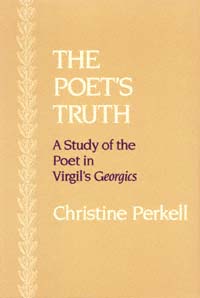 | Title: The poet's truth: a study of the poet in Virgil's Georgics Author: Perkell, Christine Published: University of California Press, 1989 Subjects: Classics | Classical Literature and Language Publisher's Description: The controversy over Virgil's optimism or pessimism, which has long absorbed readers of his poetry, might fruitfully yield to a perspective which allows contradictions to stand unresolved, to constitute, in fact, the essence of his poems' meaning. So interpreted, the pervasive contradictions of the Georgics are not problems to be solved, but expressions of the poet's vision of fundamental tensions in human experience.Focusing on the figure of the poet in his relationship to the farmer, Professor Perkell studies oppositions between power and beauty, profit and art, matter and spirit, which are critical to the poem's meaning. She points to the poet's privileging of myth over praeceptum , of divine revelation over experiment and practice, and of mystery over solution. The poem's oppositions find ultimate expression in the bougonia , literally false as Georgic precept but metaphorically true as image of Iron Age technology and culture. Through this metaphor, the poet suggests the high value of his own truth and implicitly challenges the values of the agricultural, material poem which the Georgics on its surface professes to be.Shaped by insights of reader-response and structuralist criticism, this new study of the Georgics should interest Classicists and students of literature. [brief] Similar Items |
| 2. | 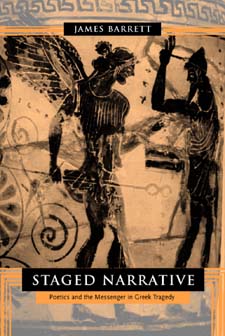 | Title: Staged narrative: poetics and the messenger in Greek tragedy Author: Barrett, James 1953- Published: University of California Press, 2002 Subjects: Classics | Classical Literature and Language Publisher's Description: The messenger who reports important action that has occurred offstage is a familiar inhabitant of Greek tragedy. A messenger informs us about the death of Jocasta and the blinding of Oedipus, the madness of Heracles, the slaughter of Aigisthos, and the death of Hippolytus, among other important events. Despite its prevalence, this conventional figure remains only little understood. Combining several critical approaches - narrative theory, genre study, and rhetorical analysis - this lucid study develops a synthetic view of the messenger of Greek tragedy, showing how this role illuminates some of the genre's most persistent concerns, especially those relating to language, knowledge, and the workings of tragic theater itself. James Barrett gives close readings of several plays including Aeschylus's Persians, Sophocles' Electra and Oedipus Tyrannus, and Euripides' Bacchae and Rhesos. He traces the literary ancestry of the tragic messenger, showing that the messenger's narrative constitutes an unexplored site of engagement with Homeric epic, and that the role illuminates fifth-century b.c. experimentation with modes of speech. Breaking new ground in the study of Athenian tragedy, Barrett deepens our understanding of many central texts and of a form of theater that highlights the fragility and limits of human knowledge, a theme explored by its use of the messenger. [brief] Similar Items |
| 3. | 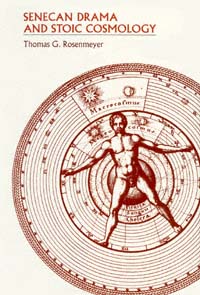 | Title: Senecan drama and stoic cosmology Author: Rosenmeyer, Thomas G Published: University of California Press, 1989 Subjects: Classics | Classical Literature and Language | Classical Philosophy | Theatre Publisher's Description: Lucius Annaeus Seneca, Nero's tutor and advisor, wrote philosophical essays, some of them in the form of letters, and dramas on Greek mythological topics, which since the early Renaissance have exercised a powerful influence on the European theater. Because in his essays Seneca, in his own eclectic way, subscribes to the philosophy of the Stoic school, scholars and critics have long been asking the question whether the plays, also, could be regarded as transmitters of Stoic thought. Various answers, ranging from a categorical no to an uneasy yes, have been given.With few exceptions, the students who have concerned themselves with this question have looked for their enlightenment in Stoic psychology and Stoic ethics. In this book, Thomas G. Rosenmeyer proposes instead to look at the Stoic science of nature, of the world and human beings in the world, as a more plausible grounding for the difference between Senecan drama and its Greek predecessors. In the process of looking at what the Stoics, especially the early Stoics, had to say about the forces determining natural phenomena, the author uncovers a deeply pessimistic strain in Stoic cosmology, and an interest in physicality and environmental tension, that he finds replicated in the theater, not only of Seneca, but also of the later European tradition indebted to him. [brief] Similar Items |
| 4. | 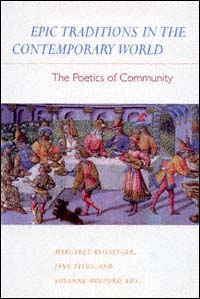 | Title: Epic traditions in the contemporary world: the poetics of community Author: Beissinger, Margaret H Published: University of California Press, 1999 Subjects: Literature | Classics | Classical Literature and Language | Comparative Literature Publisher's Description: The epic tradition has been part of many different cultures throughout human history. This noteworthy collection of essays provides a comparative reassessment of epic and its role in the ancient, medieval, and modern worlds, as it explores the variety of contemporary approaches to the epic genre. Employing theoretical perspectives drawn from anthropology, literary studies, and gender studies, the authors examine familiar and less well known oral and literary traditions - ancient Greek and Latin, Arabic, South Slavic, Indian, Native American, Italian, English, and Caribbean - demonstrating the continuing vitality of the epic tradition.Juxtaposing work on the traditional canon of western epics with scholarship on contemporary epics from various parts of the world, these essays cross the divide between oral and literary forms that has long marked the approach to the genre. With its focus on the links among narrative, politics, and performance, the collection creates a new dialogue illustrating the sociopolitical significance of the epic tradition. Taken together, the essays raise compelling new issues for the study of epic, as they examine concerns such as national identity, gender, pedagogy, and the creation of the canon. [brief] Similar Items |
| 5. | 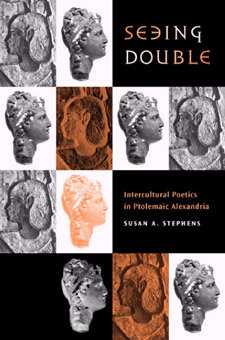 | Title: Seeing double: intercultural poetics in Ptolemaic Alexandria Author: Stephens, Susan A Published: University of California Press, 2003 Subjects: Classics | Classical Literature and Language | Poetry | Classical Politics Publisher's Description: When, in the third century B.C.E., the Ptolemies became rulers in Egypt, they found themselves not only kings of a Greek population but also pharaohs for the Egyptian people. Offering a new and expanded understanding of Alexandrian poetry, Susan Stephens argues that poets such as Callimachus, Theocritus, and Apollonius proved instrumental in bridging the distance between the two distinct and at times diametrically opposed cultures under Ptolemaic rule. Her work successfully positions Alexandrian poetry as part of the dynamic in which Greek and Egyptian worlds were bound to interact socially, politically, and imaginatively. The Alexandrian poets were image-makers for the Ptolemaic court, Seeing Double suggests; their poems were political in the broadest sense, serving neither to support nor to subvert the status quo, but to open up a space in which social and political values could be imaginatively re-created, examined, and critiqued. Seeing Double depicts Alexandrian poetry in its proper context - within the writing of foundation stories and within the imaginative redefinition of Egypt as "Two Lands" - no longer the lands of Upper and Lower Egypt, but of a shared Greek and Egyptian culture. [brief] Similar Items |
| 6. | 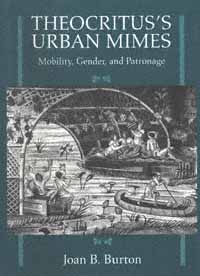 | Title: Theocritus's urban mimes: mobility, gender, and patronage Author: Burton, Joan B 1951- Published: University of California Press, 1995 Subjects: Classics | Classical Literature and Language | Women's Studies Publisher's Description: Drawing on current literary, cultural, and historical approaches, Joan Burton presents sophisticated new readings of Theocritus's urban mimes, which are among the most frequently cited evidence of Hellenistic cultural life, religion, magic, and aesthetics. Unlike Theocritus's bucolic poems, which focus on the male experience, all of his urban mimes represent women in more central and powerful roles, reflecting the growing visibility of Greek women at the time. A work of both innovation and wide-ranging scholarship, this book will be welcomed not only by students of the Hellenistic age but also by readers interested in issues of gender, sexuality, and culture in the ancient world. [brief] Similar Items |
| 7. | 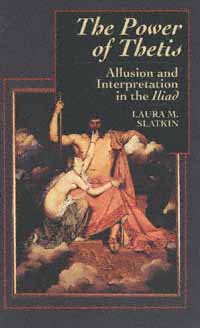 | Title: The power of Thetis: allusion and interpretation in the Iliad Author: Slatkin, Laura M Published: University of California Press, 1992 Subjects: Classics | Classical Literature and Language | Classics Publisher's Description: In The Power of Thetis, Laura M. Slatkin reveals the full importance of mythic allusion in Homeric composition and in the experience of Homer's audience. Similar Items |
| 8. | 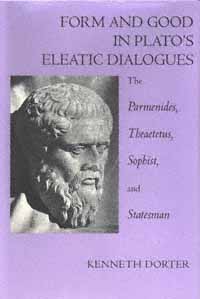 | Title: Form and good in Plato's Eleatic dialogues: the Parmenides, Theaetetus, Sophist, and Statesman Author: Dorter, Kenneth 1940- Published: University of California Press, 1994 Subjects: Classics | Philosophy | Classical Literature and Language Publisher's Description: In this innovative analysis, Plato's four eleatic dialogues are treated as a continuous argument. In Kenneth Dorter's view, Plato reconsiders the theory of forms propounded in his earlier dialogues and through an examination of the theory's limitations reaffirms and proves it essential. Contradicted are both those philosophers who argue that Plato espoused his theory of forms uncritically and those who argue that Plato in some sense rejected the theory and moved toward the categorical analysis developed byAristotle. Dorter's reexamination of Plato's insights implies an important new direction for modern philosophical inquiry. [brief] Similar Items |
| 9. | 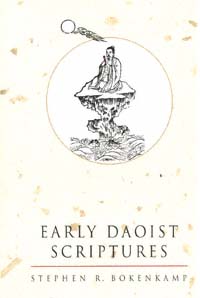 | Title: Early Daoist scriptures Author: Bokenkamp, Stephen R 1949- Published: University of California Press, 1997 Subjects: Religion | China | Classical Literature and Language | Taoism Publisher's Description: For centuries Daoism (Taoism) has played a central role in the development of Chinese thought and civilization, yet to this day only a few of its sacred texts have been translated into English. Now Stephen R. Bokenkamp introduces the reader to ancient scriptures never before published in the West, providing a systematic and easily accessible introduction to early Daoism (c. 2nd-6th C.E.). Representative works from each of the principal Daoist traditions comprise the basic structure of the book, with each chapter accompanied by an introduction that places the material within a historical and cultural context. Included are translations of the earliest Daoist commentary to Laozi's Daode jing (Tao Te Ching); historical documents relating the history of the early Daoist church; a petitioning ritual used to free believers from complaints brought against them by the dead; and two complete scriptures, one on individual meditation practice and another designed to rescue humanity from the terrors of hell through recitation of its powerful charms. In addition, Bokenkamp elucidates the connections Daoism holds with other schools of thought, particularly Confucianism and Buddhism.This book provides a much-needed introduction to Daoism for students of religion and is a welcome addition for scholars wishing to explore Daoist sacred literature. It serves as an overview to every aspect of early Daoist tradition and all the seminal practices which have helped shape the religion as it exists today. [brief] Similar Items |
| 10. |  | Title: The returns of Odysseus: colonization and ethnicity Author: Malkin, Irad Published: University of California Press, 1998 Subjects: Classics | Classical History | Anthropology | Classical Literature and Language Publisher's Description: This remarkably rich and multifaceted study of early Greek exploration makes an original contribution to current discussions of the encounters between Greeks and non-Greeks. Focusing in particular on myths about Odysseus and other heroes who visited foreign lands on their mythical voyages homeward after the Trojan War, Irad Malkin shows how these stories functioned to mediate encounters and conceptualize ethnicity and identity during the Archaic and Classical periods. Synthesizing a wide range of archaeological, mythological, and literary sources, this exceptionally learned book strengthens our understanding of early Greek exploration and city-founding along the coasts of the Western Mediterranean, reconceptualizes the role of myth in ancient societies, and revitalizes our understanding of ethnicity in antiquity.Malkin shows how the figure of Odysseus became a proto-colonial hero whose influence transcended the Greek-speaking world. The return-myths constituted a generative mythology, giving rise to oral poems, stories, iconographic imagery, rituals, historiographical interpretation, and the articulation of ethnic identities. Reassessing the role of Homer and alternative return-myths, the book argues for the active historical function of myth and collective representations and traces their changing roles through a spectrum of colonial perceptions - from the proto-colonial, through justifications of expansion and annexation, and up to decolonization. [brief] Similar Items |
| 11. | 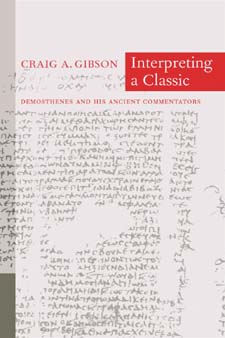 | Title: Interpreting a classic: Demosthenes and his ancient commentators Author: Gibson, Craig A 1968- Published: University of California Press, 2002 Subjects: Classics | Classical Literature and Language | Rhetoric | Classical History Publisher's Description: Demosthenes (384-322 b.c.) was an Athenian statesman and a widely read author whose life, times, and rhetorical abilities captivated the minds of generations. Sifting through the rubble of a mostly lost tradition of ancient scholarship, Craig A. Gibson tells the story of how one group of ancient scholars helped their readers understand this man's writings. This book collects for the first time, translates, and offers explanatory notes on all the substantial fragments of ancient philological and historical commentaries on Demosthenes. Using these texts to illuminate an important aspect of Graeco-Roman antiquity that has hitherto been difficult to glimpse, Gibson gives a detailed portrait of a scholarly industry that touched generations of ancient readers from the first century b.c. to the fifth century and beyond. In this lucidly organized work, Gibson surveys the physical form of the commentaries, traces the history of how they were passed down, and explains their sources, interests, and readership. He also includes a complete collection of Greek texts, English translations, and detailed notes on the commentaries. [brief] Similar Items |
| 12. | 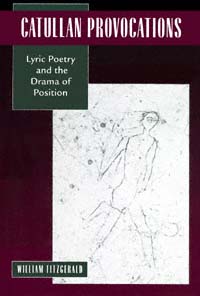 | Title: Catullan provocations: lyric poetry and the drama of position Author: Fitzgerald, William 1952- Published: University of California Press, 1996 Subjects: Classics | Comparative Literature | Classical Literature and Language | Poetry Publisher's Description: Restoring to Catullus a provocative power that familiarity has tended to dim, this book argues that Catullus challenges us to think about the nature of lyric in new ways. Fitzgerald shows how Catullus's poetry reflects the conditions of its own consumption as it explores the terms and possibilities of the poet's license. Reading the poetry in relation to the drama of position played out between poet, poem, and reader, the author produces a fresh interpretation of almost all of Catullus's oeuvre. Running through the book is an analysis of the ideological stakes behind the construction of the author Catullus in twentieth-century scholarship and of the agenda governing the interpreter's position in relation to Catullus. [brief] Similar Items |
| 13. | 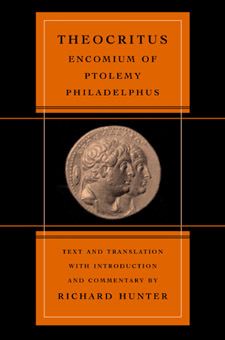 | Title: Encomium of Ptolemy Philadelphus Author: Theocritus Published: University of California Press, 2003 Subjects: Classics | Classical Literature and Language | Poetry Publisher's Description: Under Ptolemy II Philadelphus, who ruled Egypt in the middle of the third century B.C.E., Alexandria became the brilliant multicultural capital of the Greek world. Theocritus's poem in praise of Philadelphus - at once a Greek king and an Egyptian pharaoh - is the only extended poetic tribute to this extraordinary ruler that survives. Combining the Greek text, an English translation, a full line-by-line commentary, and extensive introductory studies of the poem's historical and literary context, this volume also offers a wide-ranging and far-reaching consideration of the workings and representation of poetic patronage in the Ptolemaic age. In particular, the book explores the subtle and complex links among Theocritus's poem, modes of praise drawn from both Greek and Egyptian traditions, and the subsequent flowering of Latin poetry in the Augustan age. As the first detailed account of this important poem to show how Theocritus might have drawn on the pharaonic traditions of Egypt as well as earlier Greek poetry, this book affords unique insight into how praise poetry for Ptolemy and his wife may have helped to negotiate the adaptation of Greek culture that changed conditions of the new Hellenistic world. Invaluable for its clear translation and its commentary on genre, dialect, diction, and historical reference in relation to Theocritus's Encomium, the book is also significant for what it reveals about the poem's cultural and social contexts and about Theocritus' devices for addressing his several readerships. COVER IMAGE: The image on the front cover of this book is incorrectly identified on the jacket flap. The correct caption is: Gold Oktadrachm depicting Ptolemy II and Arsinoe (mid-third century BCE; by permission of the Museum of Fine Arts, Boston). [brief] Similar Items |
| 14. | 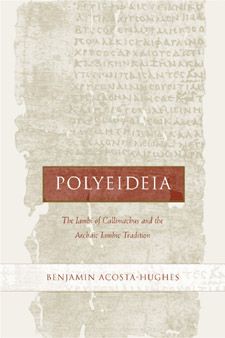 | Title: Polyeideia: the Iambi of Callimachus and the archaic Iambic tradition Author: Acosta-Hughes, Benjamin 1960- Published: University of California Press, 2002 Subjects: Classics | Classical Literature and Language | Poetry Publisher's Description: This book provides a new literary treatment of an often-overlooked collection of fragmentary poems from the third century B.C.E. Alexandrian poet Callimachus. Callimachus' Iambi form a collection of thirteen poems, which rework archaic Greek iambography and look forward to Roman satire and other genres, especially to such collections as Horace's Epodes. The poems are especially significant as examples of cultural memory since they are composed both as an act of commemorating earlier poetry and as a manipulation of traditional features of iambic poetry to refashion the iambic genre. This book fills a significant gap by providing the first complete translation of several of these fragmentary poems in English, along with line-by-line commentary, notes, and literary analysis. The structure of the book is thematic, with chapters focusing on such topics as poetic voice, fable, ethical criticism, and statuary. Each chapter consists of an introduction, text and selected critical apparatus, translation, and comprehensive thematic discussion. Acosta-Hughes focuses especially on Callimachus' manipulation of traditional features of archaic iambic poetry such as persona loquens, ethical and critical message, and eristic dialogue. He also includes a detailed analysis of the Alexandrian poet's artistic relationship with the earlier iambic poets Archilochus and Hipponax. Polyeideia will interest not only readers of Greek and Hellenistic poetry but also readers of Roman satire and invective verse, as well as those intrigued by the processes of memorializing and fashioning poetic culture. [brief] Similar Items |
| 15. | 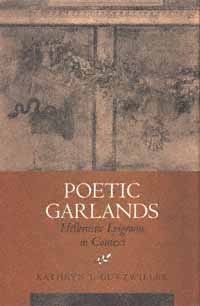 | Title: Poetic garlands: Hellenistic epigrams in context Author: Gutzwiller, Kathryn J Published: University of California Press, 1998 Subjects: Classics | Classical Literature and Language | Comparative Literature | Literature Publisher's Description: Epigrams, the briefest of Greek poetic forms, had a strong appeal for readers of the Hellenistic period (323-31 B.C.). One of the most characteristic literary forms of the era, the epigram, unlike any other ancient or classical form of poetry, was not only composed for public recitation but was also collected in books intended for private reading. Brief and concise, concerned with the personal and the particular, the epigram emerged in the Hellenistic period as a sophisticated literary form that evinces the period's aesthetic preference for the miniature, the intricate, and the fragmented.Kathryn Gutzwiller offers the first full-length literary study of these important poems by studying the epigrams within the context of the poetry books in which they were originally collected. Drawing upon ancient sources as well as recent papyrological discoveries, Gutzwiller reconstructs the nature of Hellenistic epigram books and interprets individual poems as if they remained part of their original collections. This approach results in illuminating and original readings of many major poets, and demonstrates that individual epigrammatists were differentiated by gender, ethnicity, class status, and philosophical views. In an important final chapter, Gutzwiller reconstructs much of the poetic structure of Meleager's Garland , an ancient anthology of Hellenistic epigrams. [brief] Similar Items |
| 16. | 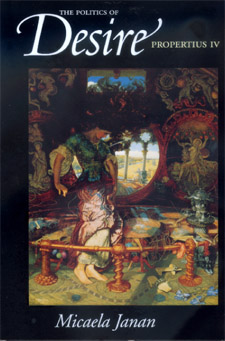 | Title: The politics of desire: Propertius IV Author: Janan, Micaela Wakil Published: University of California Press, 2000 Subjects: Classics | Classical Literature and Language | Poetry Publisher's Description: Propertius (ca. 54 b.c.--ca. 2 b.c.) was a Roman poet who composed four compelling books of elegies in the chaotic years surrounding Rome's transition from republic to empire. The first three of these books revolve mostly around a tormented love affair with a woman called Cynthia. The fourth book of poetry rests on more diverse subject matter and is notoriously the most opaque and elusive. In The Politics of Desire, Micaela Janan radically reassesses Propertius' last elegies, using contemporary psychoanalytic theory to illuminate these challenging texts. Janan finds that the upheaval of Rome's transformation to empire corresponds to the intellectually unsettled conditions of our own time, so that contemporary methodologies offer an uncannily suitable approach for understanding Propertius. In particular, she uses the work of Jacques Lacan, since it provides the best conceptual tools for examining the relation between political crisis and the struggles of the self, a theme that resonates in these difficult elegies. This book expands our understanding of an important Roman poet, and its innovative and sophisticated methodological approach makes a substantial contribution to feminist and psychoanalytic criticism. In addition, Janan addresses elegy's relationship to larger cultural questions, and broadens our understanding of the social crisis affecting Rome during the early empire. [brief] Similar Items |
| 17. | 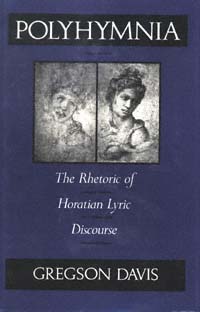 | Title: Polyhymnia: the rhetoric of Horatian lyric discourse Author: Davis, Gregson Published: University of California Press, 1991 Subjects: Classics | Classical Literature and Language | Rhetoric Publisher's Description: Horace's Odes have a surface translucency that belies their rhetorical sophistication. Gregson Davis brings together recent trends in the study of Augustan poetry and critical theory and deftly applies them to individual poems. Exploring four rhetorical strategies - what he calls modes of assimilation, authentication, consolation, and praise and dispraise - Davis produces enlightening, new interpretations of this classic work. Polyhymnia , named after one of the Muses invoked in Horace's opening poem, revises the common image of Horace as a complacent, uncomplicated, and basically superficial singer. Focusing on the artistic persona - the lyric "self" that is constituted in the text - Davis explores how the lyric speaker constructs subtle "arguments" whose building-blocks are topoi, recurrent motifs, and generic conventions. By examining the substructure of lyric argument in groupings of poems sharing similar strategies, the author discloses the major principles that inform Horatian lyric composition. [brief] Similar Items |
| 18. | 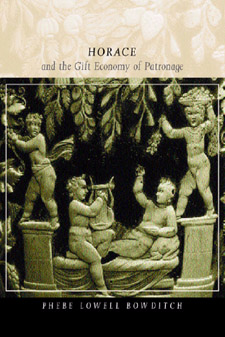 | Title: Horace and the gift economy of patronage Author: Bowditch, Phebe Lowell 1961- Published: University of California Press, 2001 Subjects: Classics | Classical Literature and Language | Poetry | Cultural Anthropology Publisher's Description: This innovative study explores selected odes and epistles by the late-first-century poet Horace in light of modern anthropological and literary theory. Phebe Lowell Bowditch looks in particular at how the relationship between Horace and his patron Maecenas is reflected in these poems' themes and rhetorical figures. Using anthropological studies on gift exchange, she uncovers an implicit economic dynamic in these poems and skillfully challenges standard views on literary patronage in this period. Horace and the Gift Economy of Patronage provides a striking new understanding of Horace's poems and the Roman system of patronage, and also demonstrates the relevance of New Historicist and Marxist critical paradigms for Roman studies. In addition to incorporating anthropological and sociological perspectives, Bowditch's theoretical approach makes use of concepts drawn from linguistics, deconstruction, and the work of Michel Foucault. She weaves together these ideas in an original approach to Horace's use of golden age imagery, his language concerning public gifts or munera, his metaphors of sacrifice, and the rhetoric of class and status found in these poems. Horace and the Gift Economy of Patronage represents an original approach to central issues and questions in the study of Latin literature, and sheds new light on our understanding of Roman society in general. [brief] Similar Items |
| 19. | 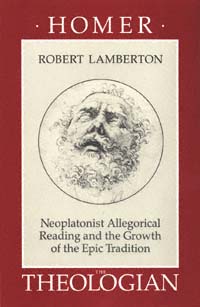 | Title: Homer the theologian: Neoplatonist allegorical reading and the growth of the epic tradition Author: Lamberton, Robert Published: University of California Press, 1989 Subjects: Classics | Classical Literature and Language | Literary Theory and Criticism Publisher's Description: Here is the first survey of the surviving evidence for the growth, development, and influence of the Neoplatonist allegorical reading of the Iliad and Odyssey. Professor Lamberton argues that this tradition of reading was to create new demands on subsequent epic and thereby alter permanently the nature of European epic. The Neoplatonist reading was to be decisive in the birth of allegorical epic in late antiquity and forms the background for the next major extension of the epic tradition found in Dante. [brief] Similar Items |
| 20. | 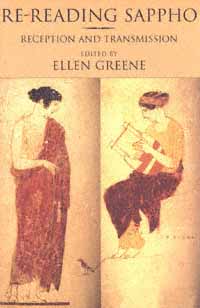 | Title: Re-reading Sappho: reception and transmission Author: Greene, Ellen 1950- Published: University of California Press, 1998 Subjects: Classics | Classical Literature and Language | Literary Theory and Criticism | Poetry Publisher's Description: Re-Reading Sappho reflects the recent fascination with Sappho's "afterlife." The essays examine the changing interpretations of scholars and writers who have read the fragmentary remains of Sappho's poetry. As the contributors explore the ways that each generation creates its own Sappho, the Sapphic tradition itself becomes an index to changing sensibilities and cultural norms about sexuality, gender roles, and notions of fema le authorship.A legendary literary figure, Sappho has attracted readers, critics, and biographers ever since she composed poems on the island of Lesbos at the close of the seventh century B.C. Bringing together some of the best recent criticism on the subject, this volume, together with Reading Sappho, represents the first anthology of Sappho scholarship, drawing attention to Sappho's importance as a poet and reflecting the diversity of critical approaches in classical and literary scholarship during the last several decades. [brief] Similar Items |